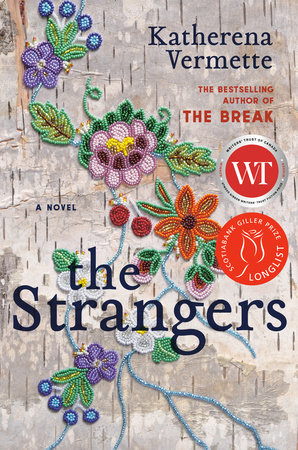
The Strangers by Katherena Vermette
It should come as no surprise that The Strangers, Katherena Vermette’s companion to the multi-award-winning novel The Break, garnered a spot on the Scotiabank Giller Prize longlist and the Atwood Gibson Writers’ Trust Fiction Prize shortlist. Revisiting the character of Phoenix, arguably the strongest of the characters in her previous book, The Strangers is a devastatingly beautiful dive deeper into the girl’s story, and that of her family.
The Strangers follows a similar path and structure to The Break, with chapters shifting focus between female members of the Stranger family: Phoenix, her younger sister, Cedar Sage, their mother, Elsie, and their grandmother, Margaret. Each is tragic in her own way, and the truths revealed through their individual stories serve to inform those of the others.
Themes of multi-generational trauma, racism, misogyny, colonialism, and abuse permeate the story. Vermette guides the reader along the edges of her characters’ suffering, often revealing the full scope of the traumas only after we’ve been coerced into picking up the breadcrumbs she has left as a trail for us to follow. It’s a masterful technique that allows the reader to focus on how each woman deals with her pain and disappointments rather than dwelling on the events themselves. The characters’ reactions mostly fall into one of two camps – rage or sadness – though there is a fair amount of bleed between the two.
Vermette deftly manipulates her narrative to showcase the patterns that emerge over the course of generations. Margaret felt unseen and unloved by her mother, Annie, and was distant to her daughter Elsie (and Elsie’s brothers) in turn. Deprived of a loving relationship with Margaret, Elsie ironically finds an ally and warm berth with Annie, who softens toward her granddaughter in a way that only serves to enrage Margaret all the more.
Though Margaret describes her as weak and spoiled, Elsie comes across as simply sad and needy in flashbacks that trace her trajectory from teen mom to homeless drug addict. When it is revealed that Margaret unwittingly cast the stone that rippled out into circles of devastation for her daughter and granddaughters, it is one of the most heartbreaking moments in the book, and it serves to underscore how seemingly small acts of cruelty can have as much impact as blunt force.
It’s a message illustrated not just in the relationships between the Strangers but also in their interactions with the world around them. The racism that feeds the attitudes of various characters runs the gamut from overt to subtle, but its effects are equally damaging in every case, as Vermette expertly demonstrates.
“Margaret used to think this was normal, that all families were made up of so many sad stories. But as she got older, it seemed only Indians, Métis, who had sorrow built into their bones, who exchanged despair as ordinarily as recipes, who had devastation after devastation after dismissal after denial woven into their skin. As if sad stories were the only heirloom they had to pass on.”
